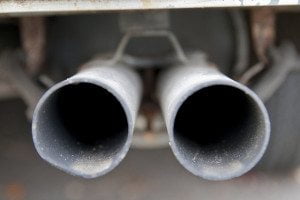

Energy
Climate Factors Fuel Both Gloom and Bloom for Car Makers
A new report, analyzing 15 of the world’s largest automakers with combined market capitalization of US$846 billion, has found that tightening regulations on emissions are having a significant business impact in the wake of the Volkswagen scandal six months ago.
The report uses data from CDP – voted no. 1 climate change research provider in 2015 by institutional investors – and shows Volkswagen is not the only car maker potentially facing significant penalties as regulations on fleet emissions tighten around the world. Seven* other car makers potentially also face up to US$4.8 billion in penalties (from the EU and US combined) for non-compliance on their fleet emissions. The two US car giants General Motors and Ford are the companies at most notable risk – their penalties could potentially equate to a combined US$1.8 billion (114% of EBIT) and US$1.2 billion (27% of EBIT) respectively.**
The report also identifies several automakers who have taken a lead on ‘advanced vehicles***’ which puts them at a competitive advantage, especially in light of the Paris Agreement to limit emissions reached last December and increasing measures to disadvantage diesel vehicles. Nissan, Renault and Volkswagen are the only car makers to receive an ‘A’ grade from CDP in this area. Volkswagen launched five new models of advanced vehicles last year, contributing to a three-fold increase in advanced vehicles sales volume globally. There is explosive opportunity in China from advanced vehicles where some of the most stringent passenger vehicle fleet emissions targets combines with a booming market (CDP estimates China could have nearly two million advanced vehicle sales in 2020).
CDP’s automotive ‘Super League Table (SLT)’ highlights those best prepared for climate regulation:
Paul Simpson, Chief Executive Officer of CDP, said: “It’s time for car makers to take climate change seriously. Six months on from the VW emissions scandal, today’s new investor research shows that too many companies still fall short in the light of stringent regulation and possible penalties on fleet emissions and that’s a significant risk for the sector as a whole. By performing well in areas such as advanced vehicles and supporting low carbon regulation manufacturers such as Nissan, Renault, BMW and Toyota are putting themselves in the fast lane for future growth.”
Collectively, the 15 companies in the report represent around 90% of the global auto market by sales volume. Other findings of today’s report include:
Emission impossible? Passenger vehicle fleet emission targets are currently not aligned with International Energy Agency (IEA)’s 2-degree pathway required for light-duty passenger vehicles meaning we can expect tougher limits in the future.
Manufacturing emissions: About 20% of the industry’s emissions come from the manufacturing stage. BMW, Volkswagen, Daimler and FCA were the only companies to receive an ‘A’ grade on management of emissions at this stage of the process.
Leaders and laggards on carbon regulation: Around half of the automakers were found to be at least mildly supportive of low carbon regulation. Daimler, Hyundai and FCA were clear laggards with ‘E’ grades in this area.
China gears up: China has some of the most stringent targets on fleet emissions, which could be a game changer that puts 5m electric vehicles on the road by 2020.
Volkswagen downgraded: Volkswagen is ranked in eleventh place, compared to sixth place when CDP produced a similar report in Feb 2015. It receives an ‘E’ grade for fleet emissions following its emissions scandal; but on the positive side achieves ‘A’ grades in the advanced vehicles and manufacturing emissions criteria.
Kia is the only non-discloser: Kia is the only one of the top 16 automakers globally that did not respond to CDP’s climate change questionnaire therefore is not included in the analysis. Investors should ask Kia why it is not providing sufficient transparency on its carbon emissions.
The car in front is a Nissan: Nissan is the top performing company in CDP’s rankings, consistent with CDP’s analysis in Feb 2015. It maintains its leadership in battery electric vehicles (BEV) as its LEAF is the best-selling BEV globally. Renault, BMW and Toyota are the other clear leaders in the overall ranking.
James Magness, CDP Head of Investor Research, said:
“Around the world, regulation on fleet emissions is tightening and this research shows investors which auto companies are responding well to this challenge, and which are driving into trouble. The research also shows that regulations need to tighten even more if global warming is to be limited to a two-degree rise as agreed by world leaders in Paris last year.”
“We also need more to be invested in advanced vehicle technologies, and it is clear from this research that some companies are capturing growth opportunities in this area much more effectively than others”


 Environment12 months ago
Environment12 months agoAre Polymer Banknotes: an Eco-Friendly Trend or a Groundswell?

 Features11 months ago
Features11 months agoEco-Friendly Cryptocurrencies: Sustainable Investment Choices

 Features12 months ago
Features12 months agoEco-Friendly Crypto Traders Must Find the Right Exchange

 Energy11 months ago
Energy11 months agoThe Growing Role of Solar Panels in Ireland’s Energy Future




























